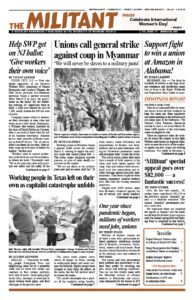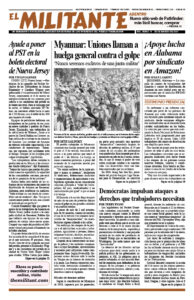Hundreds of demonstrators gathered outside a Hong Kong courthouse March 1 holding banners and shouting slogans in defiance of Beijing’s tightening crackdown on political space for working people. Forty-seven prominent protest leaders and opposition politicians faced charges filed under draconian “national security” laws imposed last June.
Signs read, “Release all political prisoners!” and “Regain HK, revolution of our times!” Police charged all 47 with “conspiracy to commit subversion.”
The arrests followed mass demonstrations against assaults on political rights, as the government in Beijing has bolstered its domination over Hong Kong. The former British colony was returned to China in 1997, and Beijing had promised “gradual and orderly progress” toward direct elections for the territory’s legislature and chief executive.
Xia Baolong, Beijing’s Hong Kong overseer, called for “severe punishment” for Joshua Wong, a former student leader, and two other protesters. Under the security law imposed by Chinese authorities, sentences include life in prison.
The 47 were charged with organizing a primary selection of candidates with the best chance of winning in the district council elections.
Candidates backing Beijing were soundly defeated in those elections, alarming the ruling party. Only half of the 70 seats are popularly elected, the rest are chosen by top business and professional groups that overwhelmingly support the Chinese government.
China’s annual National People’s Congress began March 5. Vice Chairman Wang Chen announced it would adopt a new electoral system for Hong Kong that would further limit direct elections, ensuring only true Chinese “patriots” would serve.
Pro-Beijing Hong Kong legislator Martin Liao unwittingly spoke the truth March 6 — that Beijing’s “reforms” are to prevent a “dictatorship of the majority.”
The last time so many protesters were charged with subversion in China was in the wake of Beijing’s brutal crushing of the 1989 Tiananmen Square protests.
In the past two years, over 10,000 people have been detained, while others have fled overseas. Many public sector workers have been dismissed or forced to swear loyalty oaths to Beijing.
The regime in Beijing also fears the effects of the Hong Kong protests on the massive working class and peasantry on the mainland.

